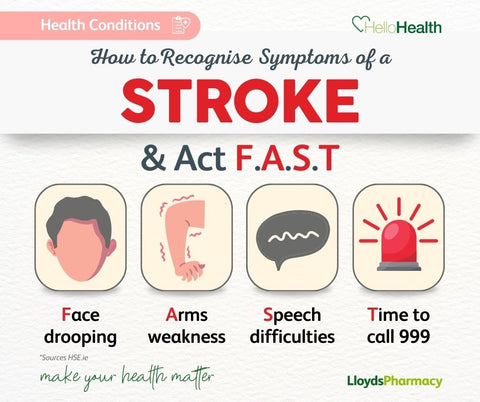Stroke

A stroke is a serious health condition that can impact one's life significantly. It occurs when there is a sudden interruption of blood flow to the brain, also known as a brain attack, which leads to brain cell death and potential permanent brain damage. It's crucial to recognise the signs and symptoms of a stroke as quickly as possible so you can seek immediate medical attention and reduce the risk of long-term complications.
Signs and Symptoms
Common symptoms of stroke can include the following
- Numbness, weakness, or paralysis on one side of the body
- Slurred speech, difficulty thinking of words or understanding other people
- Confusion
- Sudden blurred vision or sight loss
- Being unsteady on your feet
- Severe headache
A simple test can help you recognise if someone has had a stroke: F.A.S.T.
- Facial weakness – can the person smile? Has their mouth or eye drooped?
- Arm weakness – can the person raise both arms?
- Speech problems – can the person speak clearly and understand what you say?
- Time– call 999 for an ambulance if you spot any one of these signs.
If you suspect you or someone you know is having a stroke, call 999 or 112 immediately. Time is of the essence when it comes to treating a stroke and prompt treatment can reduce the severity of symptoms and improve the chances of recovery.

Types and Causes of Strokes
There are two types of strokes.
Ischaemic strokes
These are the most common and occur when a blood clot blocks the flow of blood and oxygen through to the brain. Blood clots form where the arteries have become narrow or blocked by fatty deposits. Arteries may become narrower over time but there are some lifestyle risk factors which increase the risk of clots forming. These include
- Smoking
- High Blood Pressure
- Obesity
- High Cholesterol
- Diabetes
- Physical inactivity
An irregular heartbeat, known as atrial fibrillation, is another possible cause of ischaemic strokes. This can cause blood clots in the heart which break apart and affect the blood vessels supplying the brain.
Haemorrhagic strokes or cerebral haemorrhage
These are less common than ischaemic strokes. They occur when a blood vessel in the brain bursts and bleeds. The main cause for these types of strokes is high blood pressure. This may be increased by
- Being overweight
- Smoking
- Physical inactivity
- Excessive alcohol
Haemorrhagic strokes may also be caused by a brain aneurysm which is the rupture of a blood vessel in the brain.

Reduce the Risk
While strokes cannot be completely prevented due to some factors which cannot be altered such as age, family history and medical history there are several lifestyle changes that can be made. These lifestyle changes aim to avoid problems which cause strokes, such as atherosclerosis (clogging of arteries with blood clots) and high blood pressure.
Changes that can be made to reduce the risk of stroke include
- Quit smoking
- Limit alcohol intake
- Increase exercise
- Eat a healthy diet
- Manage high blood pressure and cholesterol
Support and Advice
Your local LloydsPharmacy is a great resource to advise on stroke prevention by offering support on lifestyle changes such as help with stopping smoking, managing your blood pressure, and offering advice on a vitamins and supplements. Our highly trained colleagues are always available to assist you with being proactive about your healthcare.
References:
https://irishheart.ie/heart-and-stroke-conditions-a-z/stroke/


